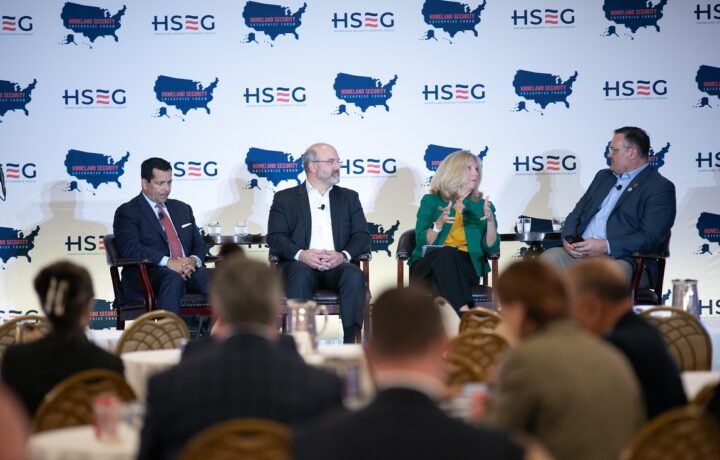On the heels of Hamas’ attack and the Israel-Hamas war, leaders across the homeland security community gathered for the Homeland Security Enterprise Forum, the leading event for government and industry professionals to come together to discuss the future of the homeland security enterprise.
Many acknowledged the terrorist attack of the prior weekend shifted the tone of the event, from what may have been looking at terrorism moving into the rearview mirror and great global competition rising to the forefront, to once again being reminded that terrorists are still quite capable of unleashing devastating consequences to even the most well-prepared national security and intelligence entities.
“For DHS, they can never take anything off of the table,” said Suzanne Spaulding, senior adviser for homeland security and director of the Defending Democratic Institutions project at the Center for Strategic and International Studies. “It’s new threats that just get added.”
In a plenary conversation, panelists emphasized that the homeland security mission is both international and interagency. “Everything we need to defend the homeland is not within DHS,” said Spaulding.
The capstone conversation hosted by Homeland Security Experts Group Executive Director Rob Walker asked panelists to reflect on the future of homeland security 20-years past 9/11. “We’ve done a great job of keeping the U.S. safe from the next 9/11. What do we do next?” he posed.
With new forms of power and new competitors always arising, and with 20 years of DHS and the Office of the Director of National Intelligence (ODNI) in existence, now may be the time to look at what has worked within those organizations – and where shifts need to be made.
William Evanina, former director of the National Counterintelligence and Security Center, said it’s time to take a ‘fresh look’ at the aggregate intelligence bodies like DHS and ODNI. “Are we apathetic?” he posed, urging consideration of the homeland security enterprise and especially its collective entities as a living body – and one that may be in need of restructuring or reenergizing.
Spaulding suggested it may be time to split off Customs and Border Protection, for instance, into its own agency, rather than existing within DHS.
“Our circle memory is valuable, but a bit of baggage,” said Juan Zarate, chairman and co-founder of the Financial Integrity Network. “We’re in a period where we have to think differently about the threats, new forms of power, and competition.”
A fresh look at homeland security comes a time when the homeland security enterprise is even more important than it was in 2002 and 2003, said Zarate.
We have met the enemy, and it is us.
Disinformation, misinformation, and distrust remain issues that affect the national security community, particularly as America heads into another polarizing election cycle.
“Our greatest weakness is our division and distraction, and our enemy knows that,” said Zarate.
The effect of a disjointed homeland was a topic that was brought up as a potential weakness for Israel, as troops had recently been pulled away from Gaza to the West Bank, several HSEF attendees noted. It’s not clear what role, if any, that had on the timing of the Hamas attack, but as the intelligence continues to be revealed it’s certainly something that will be analyzed and discussed. And it’s a reminder that divisions on the homefront are always exploited by adversaries.
Spaulding pushed for engagement on domestic disinformation.
We have a believability factor, agreed Evanina, “We have to expand and think bigger,” he said, pushing for a vision everyone can understand and that can ‘drive future thinking.’



